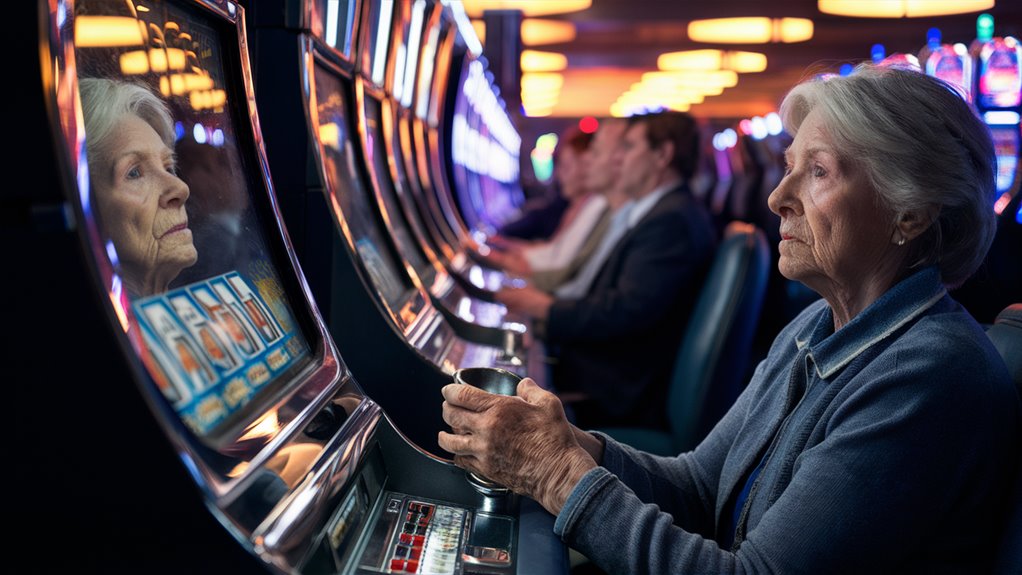
The Cultural Impact of Gambling Through History

The act of gambling has shaped human history for more than 40,000 years, evolving from simple dice games in old Mesopotamia to advanced digital betting platforms today.
Historical Growth and Cultural Mixing
Gaming words have become part of daily life, influencing our conversation, trade, and politics. Major cities have benefited from medieval lottery systems that funded city works and public projects.
Gambling’s Social Role
Religious and Cultural Meaning
Various groups perceive gambling differently – from sacred religious rites to social acts. Historically, games were used in religious rituals, while modern regulations reflect complex societal views.
Economic and Entertainment Effects
The gambling world continues to influence today’s entertainment, driving technological advancements and economic gains. From traditional casinos to mobile betting apps, these platforms generate significant revenue and influence pop culture globally.
Cultural Marks
The long history of gambling extends beyond mere entertainment, impacting:
- Economic system development
- Risk management concepts
- Advancements in probability theory
- Social customs
- Changes in the entertainment industry
This deep integration of gambling in our history highlights its significant impact on cultural evolution and social dynamics.
Ancient Roots of Gaming
The Ancient Roots of Gaming Through History
Early Gaming Finds and Practices
Artifacts reveal gaming pieces dating back over 40,000 years, showcasing humanity’s long-standing relationship with chance and skill games.
Ancient civilizations like Mesopotamia, Egypt, and the Indus Valley used astragali – sheep ankle bones that served as early dice for both religious divination and recreation https://getwakefield.com/
Ancient Asian Gaming Practices
Chinese gaming history dates to around 3000 BCE, featuring sophisticated games like liubo and early forms of dominoes.
These gaming activities went beyond mere fun, intertwining deeply with religious practices and social structures, shaping enduring traditions.
Roman Gaming Life and Regulations
The Roman Empire established special gaming areas in their cities, demonstrating gambling’s significance in ancient urban life.
Known for the first gambling regulations, Roman society combined recreational gaming with urban order, creating a framework that influenced gaming laws for years to come.
Mesoamerican Gaming Practices
Aztec gaming culture revolved around patolli, a complex game utilizing marked stones and counting boards. This game exemplified the blend of entertainment and religious practices, illustrating how ancient civilizations integrated gaming into their rituals.
Legacy of Ancient Gaming
The influence of ancient gaming persists in today’s gambling practices.
Old board games from Egypt evolved into today’s backgammon, while Roman betting practices laid the foundation for modern sports betting. These historical linkages highlight gaming’s pivotal role in human cultural development over millennia.
Cultural Perspectives Across Groups
Cultural Perspectives on Gambling Across Global Groups
Regional Variations in Gambling Acceptance
Cultural attitudes towards gambling vary widely worldwide, reflecting deep-rooted social values and historical contexts.
Western societies generally favor regulated gambling activities, with renowned destinations like Las Vegas and Monte Carlo recognized globally as premier gambling hubs. These places exemplify the high degree of accepted gambling activity, within controlled environments.
Religious and Social Influence
Islamic countries maintain strict gambling prohibitions, rooted in religious beliefs that regard gambling as immoral.
This perspective contrasts with Asian gambling cultures, where intricate regulations create unique gaming environments.
Singapore’s dual approach exemplifies this blend, operating world-class facilities while imposing strict limits on local citizens.
Regional Gambling Practices and Social Impact
Nordic Gambling Model
State-run gambling operations in Nordic countries ensure social welfare through government oversight, striking a balance between gaming accessibility and public safety.
Native American Gaming
Tribal casino operations represent a unique model where gambling serves multiple purposes:
- Revenue generation
- Cultural preservation
- Karaoke—Worth It or Not?
- Native empowerment
- Community resource development
Asian Gaming Expansion
Japanese gambling culture features unique characteristics, with activities like pachinko operating in regulated environments. This highlights how societies can adapt longstanding prohibitions to accommodate modern entertainment needs while preserving cultural values.
These diverse approaches to managing gambling norms and acceptance illustrate how societal structures shape gaming regulations through the interplay of:
- History
- Religious beliefs
- Social values
- Economic goals
- Public safety considerations
Language and Common Sayings
The Influence of Gambling Language on Today’s Communication

Integration of Gambling Language in Everyday Communication
Gambling expressions and betting terminology have become ingrained in our daily language.
From casual conversations to professional settings, these terms influence how we perceive risk, chance, and strategic decisions.
Common phrases like “betting on success” and “playing your cards right” demonstrate the extent to which gambling concepts permeate everyday dialogue.
Business and Political Language
The use of poker terminology is evident in business and political discourse.
Key expressions such as “raising the stakes,” “bluffing,” and maintaining a “poker face” have transcended gaming to become powerful metaphors for negotiation and strategy.
These terms carry significant meaning across diverse professional settings, adapting their usage to suit various contexts while retaining their core meanings where intimate connections
Values and Risk Perceptions
Imagery of Chance and Strategy
Gambling-related phrases offer deeper insights into perceptions of risk-taking and planning.
Expressions like “double or nothing” and “ace up their sleeve” illuminate views on luck, destiny, and calculated risks.
These linguistic adaptations illustrate how gambling concepts have profoundly shaped how societies perceive and discuss uncertainty, opportunities, and strategic decisions.
Impact on Contemporary Dialogue
The integration of betting language into common discourse highlights how gambling terminology has expanded beyond its original context to provide powerful tools for articulating ideas about risk, reward, and strategy across different areas of modern life.
Economic Impact Through History
The Economic Influence of Gambling Through History
Ancient Societies and Gambling Revenue
Ancient Roman gambling activities played a crucial role in funding public works and urban development. During that era, betting establishments generated substantial revenue that contributed to constructing aqueducts, roads, and civic spaces.
Similarly, the Han Dynasty’s gambling halls produced significant tax revenue, enabling territorial expansion and governance.
Medieval Gaming and Urban Development
Medieval lottery systems emerged as powerful financial tools across Europe, funding significant projects like cathedral construction and fortifications. These organized betting initiatives laid the foundation for modern public finance strategies through gambling revenue.
Frontier Revenue and Gambling Hubs
Western frontier gambling transformed small settlements into economic centers.
Notable examples include Las Vegas’s transformation from a barren locale to a thriving entertainment mecca, while Monaco’s casino industry elevated the tiny principality to global renown as a luxurious destination.
Modern Gambling Economy
Contemporary casino destinations are intricate economic systems generating:
- Employment opportunities across various sectors
- Tax revenue for public services
- Tourism growth in regions
- Further development in hospitality and entertainment
Economic Considerations and Implications
The gaming industry’s economic role presents both opportunities and challenges:
- Regional development through investment revenue
- Labor market expansion in gaming and related sectors
- Tourist revenue for local economies
- Addressing social costs including addiction support
- Regulatory measures ensuring sustainable growth
This comprehensive economic landscape continues to influence global development strategies and policy considerations in the gaming sector.
Digital Transformation in Betting
The Digital Shift in Sports Betting: A New Era
Digital Innovations Transform Betting
The digital revolution has profoundly impacted the global betting landscape, introducing new avenues for accessing gambling opportunities.
Mobile technology and rapid internet connectivity have altered how individuals engage in betting activities, breaking traditional geographical and temporal limitations.
Intelligent Technology Integration
Online betting platforms now employ sophisticated algorithms and user-friendly interfaces that mimic popular social media aesthetics. These technological advancements have ushered in new betting types such as:
- In-play betting
- Virtual sports wagering
- Cryptocurrency bets
- Instant odds updates
Digital Transformation of Betting Practices
Mobile Accessibility
Smartphone betting apps have revolutionized how we access gambling services, enabling quick bets from any location.
This digital accessibility has integrated betting activities into daily routines, transforming traditional gambling practices.
Social Dynamics
The shift from physical to virtual betting environments has altered the social aspect of gambling.
While traditional setups required face-to-face interactions, digital platforms now offer solitary, private experiences that redefine betting behaviors.
Cultural Impact
Modern betting technologies have normalized gambling activities through seamless digital integration.
This transition marks a significant shift in how we perceive entertainment and risk-taking, creating new pathways for online gaming experiences.
The interplay of technology and betting has created an environment where digital wagering becomes increasingly embedded in contemporary culture, signaling a substantial transformation in gambling practices and social norms.
Community Support and Responsibility
Community Support in Digital Gambling Landscapes
Community Engagement and Responsibility
Digital betting platforms have redefined how we approach gambling, prompting communities to demand greater operator accountability.
Local authorities and support organizations now advocate for comprehensive responsible gaming measures, including:
- Self-exclusion programs
- Spending limits
- Addiction counseling support
Cultural Perspectives on Gambling Responsibility
Regional attitudes toward gambling responsibility reveal significant variation across societies.
While some regions emphasize individual responsibility, others implement community safety mechanisms. Key community initiatives include:
- Monitoring programs for identifying problem gambling
- Cultural center educational initiatives
- Risk awareness campaigns
Operator-Community Partnerships
Gambling operators increasingly form partnerships with community organizations to address social responsibility concerns. Major financial initiatives include:
- Funding for addiction treatment centers
- Financial support for financial literacy programs
- Family communication support services
Regulatory Oversight and Social Support
The most effective community safety plans combine:
- Strict regulatory oversight
- Culturally sensitive support systems
- Comprehensive monitoring mechanisms
These measures acknowledge gambling’s broader impact on community structures and social policies.
The balance between commercial interests and social responsibility requires ongoing scrutiny and adaptation to maintain appropriate community safeguards.



